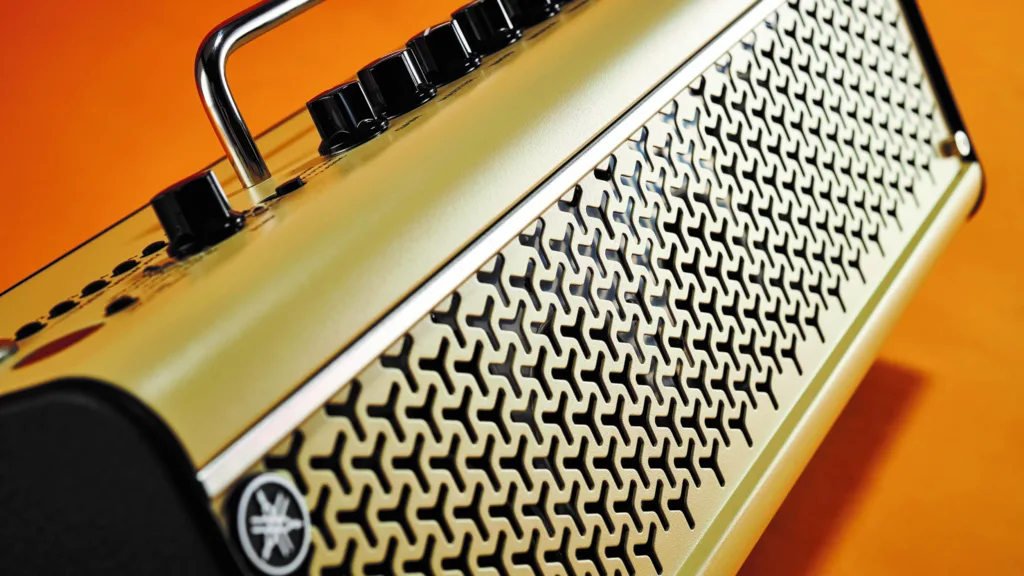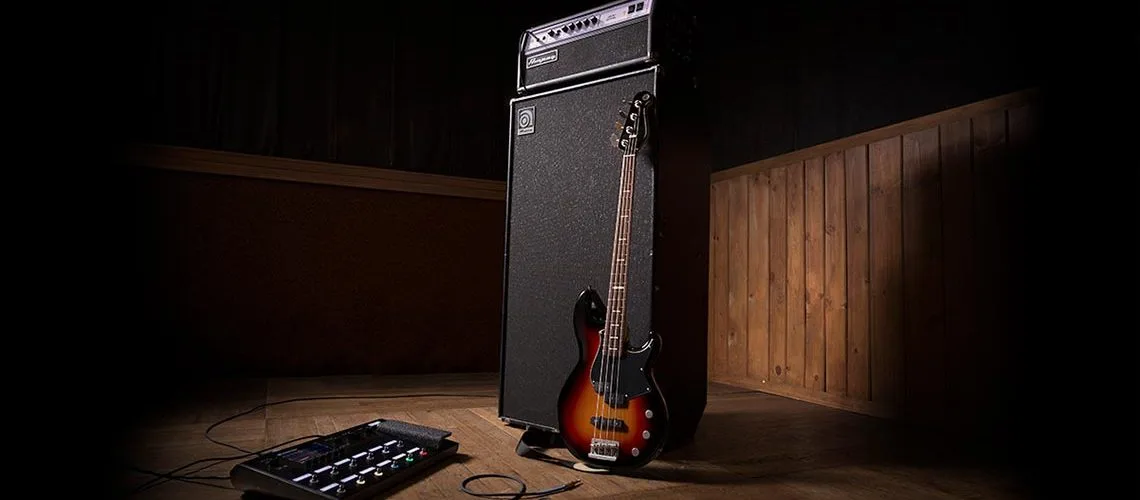Have you ever wondered if you can use your guitar amp to play bass? Maybe you’re short on space or just prefer the sound of your trusty guitar amp. Well, I’ve been in that situation before and let me tell you, it’s not as simple as just plugging in and playing. There are some important things to consider before hooking up your bass to a guitar amp. But fear not, I’ve done all the research for you! In this article, I’ll break down everything you need to know about using a guitar amp for bass so you can make an informed decision and rock out with confidence. So let’s get started and find out if playing bass through a guitar amp is possible!
So, can you play bass through a guitar amp?
You can technically play bass through a guitar amp, but it may not produce the best sound quality. Bass guitars and amps are specifically designed to handle lower frequencies and produce a deep, rich tone that is essential for creating a solid rhythm section in music. On the other hand, guitar amps are optimized for higher frequencies and may not be able to accurately reproduce the low end of a bass guitar. Additionally, playing bass through a guitar amp can potentially damage both the amp and the speaker due to the powerful vibrations produced by the bass strings. It’s always best to use an amplifier specifically made for bass instruments to ensure optimal sound quality and avoid any potential damage.
Understanding the Differences Between Bass and Standard Guitar Amps
When you dive into the world of guitars and amps, it’s easy to think all amplifiers are pretty much the same. But comparing a bass amp with a standard guitar amp reveals they’re quite different, each tailored for its instrument’s unique needs. A bass amp is specifically designed to handle lower frequencies produced by a bass guitar. These amps have larger speakers and more powerful circuits to produce deep, rich sounds without distortion.
On the other hand, standard guitar amps focus on higher frequencies. They usually come with features like built-in effects that add character to your sound—think reverb or overdrive. Guitar amps also tend to be smaller in size because they don’t need those huge speakers needed for bass tones. The tonal quality is crafted differently too; while guitarists might seek out bright, cutting tones perfect for solos and leads, bass players look for smooth low-end power that supports the entire band’s sound.
- Larger Speakers: Bass amps need them.
- Frequency Focus: Low (bass) vs High (guitar).
- Tonal Quality: Smooth support vs Bright Leads.
Understanding these differences can help you choose the right gear for your musical journey.
Whether you’re plucking away at thick strings or shredding electric riffs, having an appropriate amplifier will make all the difference in how your audience experiences your music!
The Impact of Playing Bass Through a Standard Guitar Amp on Sound Quality
So, you’ve decided to plug your bass guitar into a standard guitar amp. It might seem like a convenient choice at first glance, especially if that’s the only gear you have on hand. But let’s explore what really happens to your sound quality when you take this route. Bass guitars produce lower frequencies compared to regular electric guitars, and these deep tones can be quite demanding on an amp’s speakers and circuitry.
Imagine hitting those low notes expecting them to resonate fully, but instead finding they are dull or even distorted. This is because most guitar amps are not designed to handle such frequencies effectively. The limited capacity of a typical guitar speaker means it may struggle with the power required for bass sounds, potentially leading to damage over time. In essence:
- Muddy Sound: Your low-end notes could lose their clarity.
- Poor Dynamics: The nuanced tones of your playing may not come through as intended.
- Amp Strain: Risk of damaging the equipment due to overloading its speakers.
Moreover, there’s also the matter of tonal balance; standard guitar amps often don’t offer suitable EQ settings for bass instruments. You might find yourself constantly tweaking knobs without ever achieving that rich, full-bodied sound you’re aiming for.
Moving forward with this setup definitely compromises tone quality since each note lacks precision and depth—key elements in any good bassline! So while plugging into a standard guitar amp isn’t impossible by any means—it’s far from ideal if pristine audio fidelity matters much within one’s musical pursuits.
For consistently excellent performance consider investing proper bass amplification system caters specifically needs—to ensure every groove guesswork-free excellence guaranteed!
Read also: can you use guitar pedals for bass
Potential Risks of Using a Standard Guitar Amp for Your Bass
When it comes to musical instruments, there are specific tools designed for each purpose. Using a standard guitar amp for your bass might seem like a convenient option, but it’s riddled with potential risks that could lead to some serious headaches down the road. Guitar amps are tailored to handle the frequency range produced by guitars, which is much higher than what bass guitars generate. Plugging your bass into one may result in muddy tones and unsatisfactory sound quality because these amps lack the capability to accurately reproduce those deep, rich frequencies.
Moreover, using a guitar amp for your bass can put significant strain on the equipment itself. The lower frequencies require more power and can force the amplifier’s speaker and components beyond their intended limits. This misuse often leads to:
– Speaker damage: The cone may tear or crack under stress.
– Component overheating: Amplifier parts could overheat from excessive demand.
– Shortened lifespan: Constantly pushing an amp beyond its capacity reduces its overall longevity.
Instead of risking such issues, investing in an actual bass amp ensures you get both optimal sound performance and longevity out of your gear. Bass amplifiers are engineered specifically for those rumbling low notes we all love so dearly, providing clarity without compromising durability—making them well worth considering if you’re serious about protecting your setup’s integrity while achieving excellent sonic results.

Alternatives to Playing Bass Through a Standard Guitar Amp
When it comes to getting that deep, resonant bass sound, many folks might think they can simply plug their bass guitar into a regular guitar amp. While this seems convenient, there are much better options out there to achieve the optimal tone and prevent damage to your gear. One popular alternative is dedicated bass amplifiers. These amps are designed specifically for the lower frequencies produced by a bass guitar. They offer features like extended low-end response and higher wattage capacities which can handle those powerful vibrations without distorting or overheating.
If you’re in a pinch or looking for something more versatile, consider using PA systems. A PA system provides clear amplification across various frequencies and works well with both acoustic and electric instruments. You’ll find these particularly useful in live performance settings where clarity at different ranges is crucial. Another intriguing option is using an audio interface connected to your computer along with digital amp simulators. This setup not only allows you to experiment with countless effects but also lets you record directly onto software platforms like GarageBand or Ableton Live.
For those who value portability without compromising on quality, small yet mighty battery-powered amps could be just what you’re searching for. Many of these compact units come equipped with built-in effects and the capability to connect headphones—a perfect choice for practicing quietly at any location:
- Low-watt practice amps
- Bass-specific combo amps
- Pocket-sized headphone amplifiers
Exploring these alternatives ensures that each note plucked resonates richly while keeping your equipment safe from potential harm associated with mismatched setups.
You may also like: yamaha mini guitar
Conclusion: Assessing Whether You Should Play Bass Through a Standard Guitar Amp
Playing bass through a standard guitar amp can seem like an easy solution, especially if you’re just starting out or don’t want to invest in more gear. But let’s delve into this idea for a moment. Guitar amps are specifically designed to handle the frequency range of guitars, which is considerably higher than that of a bass. When you plug your bass into one, you might notice some distortion or muddiness in the sound because guitar amps aren’t built to reproduce those deep, low-end frequencies that give the bass its rich tone.
Another thing worth considering is the potential damage to your equipment. Guitar speakers aren’t constructed to cope with the power and depth of bass notes; pushing them too hard could lead to blown speakers or other technical problems. If you’re thinking about using your existing guitar amp for occasional bedroom practice at low volumes, it might suffice temporarily. However:
- For consistent use
- Better tonal quality and
- Long-term durability,
a dedicated bass amp is really what you’ll need.
In conclusion, while it may be tempting to use what’s already available, investing in proper gear ensures not only better sound but also longer-lasting equipment.
Your ears—and wallet—will thank you.

